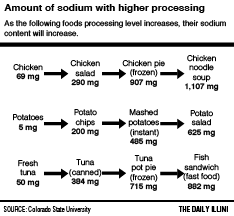Professors receive federal grants for food study

April 22, 2015
Two professors in the Department of Food Science and Human Nutrition were awarded a grant totaling $861,714 to study the damage caused by the freeze-thaw cycle of frozen food and the excess amount of sodium in processed food. The grant was given by the United States Department of Agriculture’s National Institute of Food and Agriculture and was split between the two researchers.
Youngsoo Lee, assistant professor of food science, was granted over $360,000 for his study on the amount of sodium in processed foods.
“I am really excited that the people, government agencies, funding agencies recognize this as an important research,” Lee said. “The goal of my research is to reduce sodium content in the processed food basically. And there are different types of food, so sodium is included in different ways.”
His three-year-grant study is mainly focused on the solid food containing sodium, such as cheese and sausage.
Lee said 95 percent of sodium is not released during the chewing process, which causes people to waste sodium in an effort to create a salty taste. Lee’s study aims to increase the sodium release from the food without adding too much sodium to processed foods.
Get The Daily Illini in your inbox!
“Overconsumption of sodium has been a big problem for more than forty years,” Lee said. “The average amount of sodium that adults consume per day is almost twice the amount that is recommended.”
When most people eat, their main concern is taste, Lee said. He added he hopes the study will help decrease the sodium consumption of the general public without sacrificing taste.
Lee said once the project is complete, he and his team will be able to determine the optimal food structure to release the correct amount of sodium. Industries and companies will be able to maximize the sodium released and decrease the amount added.
Pawan Takhar, associate professor of food engineering, also focused on the quality of food. Takhar said he received nearly $500,000 to study the damage caused by the ice crystal formation during the freeze-thaw cycles, and moisture migration in food materials.
He said he was excited to receive this grant, since federal funding has gone down over the years.
Takhar said he will conduct the four-year study with Shyam Sablani, associate professor of biological systems engineering at Washington State University.
Takhar said the crystal formation in frozen food can frequently be seen in grocery stores and can damage the food quality and the nutrition.
“In our work, we’ll be developing some fundamental, mathematical equations which can calculate how these crystals grow in the food structures.” Takhar said, “We are aiming to generate general information so that it applies not only to one specific product but various frozen products as well.”
Ying Zhao, a Ph.D. student in the Department of Agricultural and Biological Engineering, said that in the experiments they designed different cycles of freezing, such as minus 17 degrees to 16 degrees and from minus 17 degrees to minus 7 degrees. Zhao said larger ice crystals formed as the temperature increased, leading to a decrease in quality.
Tanjila Alam, a graduate student in the Department of Agricultural and Biological Engineering said food may last longer if stored at a lower temperature although it will cost more energy.
Takhar said he expects food companies to use the study to improve their operation processes and reduce energy consumption during freezing-thawing cycles. Companies will also be able to improve the quality and reduce the costs of food materials by reducing waste.






